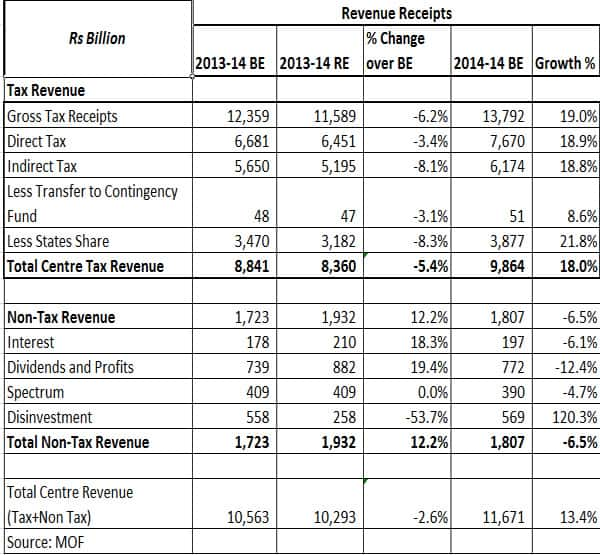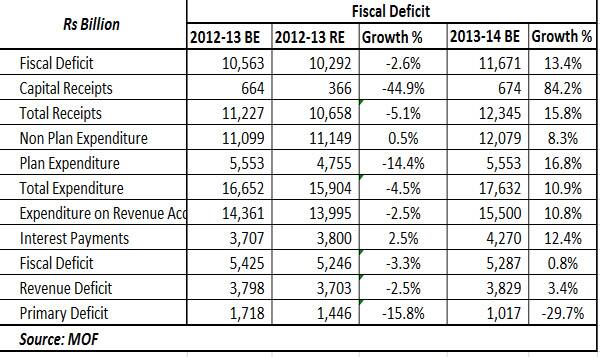The government is showing a fiscal deficit of 4.1 percent of GDP for 2014-15 against 4.6 percent of GDP seen in 2013-14. The government hopes to achieve a lower fiscal deficit target through revenues coming in higher than expenditures. Revenues, tax plus non-tax revenues, are expected to grow at 13.4 percent for fiscal 2014-15 while expenditure is expected to grow at 10.9 percent. A marginal rise in the absolute value of fiscal deficit coupled with a projected growth of 13.1 percent in nominal GDP will help the government achieve a lower fiscal deficit ratio.
Expenditure Analysis
On the expenditure side, the government is projecting a growth of 8.3 percent in non plan expenditure and a growth of 16.8 percent in plan expenditure. Non-plan expenditure grew by 0.4 percent in fiscal 2013-14 while plan expenditure fell by 14.4 percent against budget estimates. The government is effectively projecting non-plan expenditure at budgeted levels of fiscal 2013-14.
On the subsidy front, fuel subsidy exceeded budget estimates by 31 percent while food and fertiliser subsidy exceeded estimates by 3 percent and 2 percent respectively. Food subsidy is expected to grow by 21 percent in fiscal 2014-15 to pay for the food security bill while fuel subsidy is expected to fall by 26 percent. The government has consistently missed fuel subsidy targets and if it cannot pass through oil prices to end user, the bill could well be higher in 2014-15.
Interest costs form the bulk of expenditure showing a growth of 12.4 percent in fiscal 2014-15. Government is consistently borrowing to fund its fiscal deficit and interest costs are bound to rise every year. Interest and subsidies as percentage of GDP are at 3.3 percent and 1.9 percent respectively. Interest costs eat up 37 percent of the government’s revenues - and account for 80 percent of the planning borrowings in 2014-15.
Put another way, four out of every five rupees borrowed is going to pay interest. This is not quite a debt trap, but the government is getting there.
Table 1 gives the expenditure estimates for fiscal 2014-15
[caption id=“attachment_76755” align=“aligncenter” width=“600”]
 Table 1[/caption]
Table 1[/caption]
Revenue Analysis
On the revenue side, total tax revenues are expected to rise by 19 percent in fiscal 2014-15 against a drop of 6.2 percent seen in fiscal 2013-14 against budget estimates. The government has not changed direct tax numbers but has cut excise duty on automobiles, capital goods and consumer durables. Government expects an overall economic growth to push up tax collections.
A tax break up shows service tax growth to be highest at 30 percent while income and corporate taxes are expected to grow at 27 percent and 14.5 percent respectively in fiscal 2014-15. Service tax is emerging as a strong revenue earner for the government. In the absence of implementation of the GST (Goods and Services Tax) and a new direct tax code, the government is finding it tough to raise the tax to GDP ratio that is hovering around 10 percent levels for over 10 years.
On the non-tax revenue side, disinvestment is expected to rise by 120 percent in 2014-15 while revenues from spectrum auctions, interest and dividends are expected to drop. Total non-tax revenue is expected to drop by 6.5 percent.
Table 2 gives the revenue estimates for 2014-15.
[caption id=“attachment_76756” align=“aligncenter” width=“600”]
 Table 2[/caption]
Table 2[/caption]
Fiscal Deficit
Fiscal deficit is expected to come in at Rs 5,287 billion in fiscal 2014-15, a growth of 0.8 percent over fiscal 2013-14. Revenue and primary deficits are expected to grow at 3.4 percent and a negative 29.7 percent respectively. Revenue deficit is slated at 2.97 percent of GDP. Government will have to lower revenue deficit if it has to bring down fiscal deficit as interest costs will continue to rise year on year.
Table 3 gives the fiscal deficit numbers for 2014-15.
[caption id=“attachment_76759” align=“aligncenter” width=“600”]
 Table 3[/caption]
Table 3[/caption]
Arjun Parthasarathy is the Editor of www.investorsareidiots.com a web site for investors
Arjun Parthasarathy has spent 20 years in the financial markets, having worked with Indian and multinational organisations. His last job was as head of fixed income at a mutual fund. An MBA from the University of Hull, he has managed portfolios independently and is currently the editor of www.investorsareidiots.com </a>. The website is for investors who want to invest in the right financial products at the right time.
)